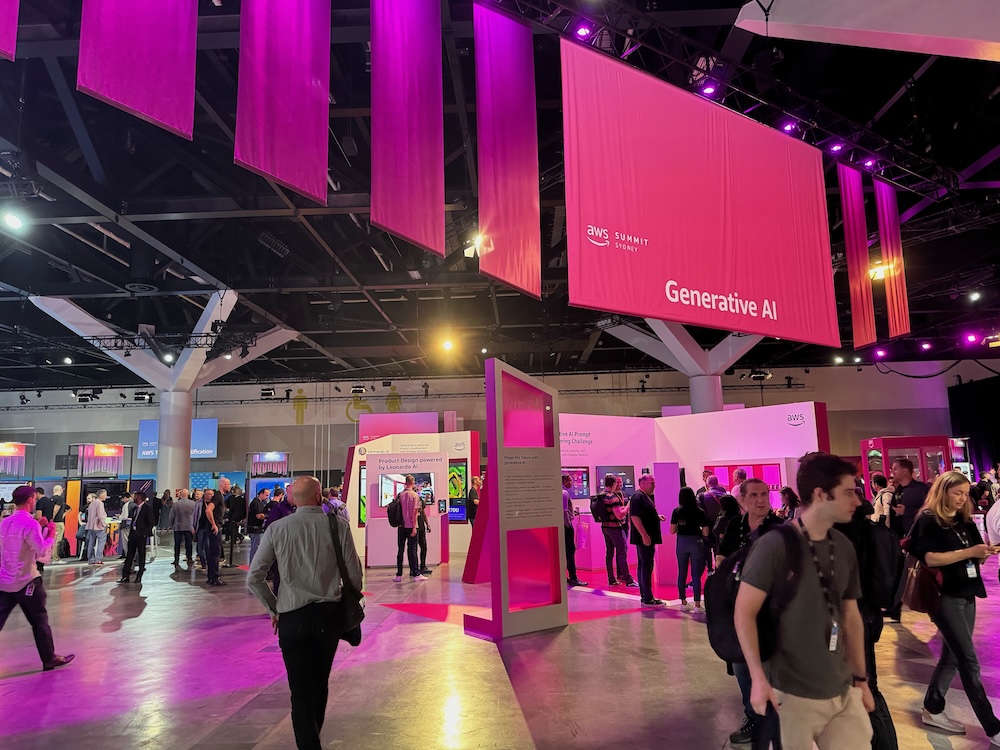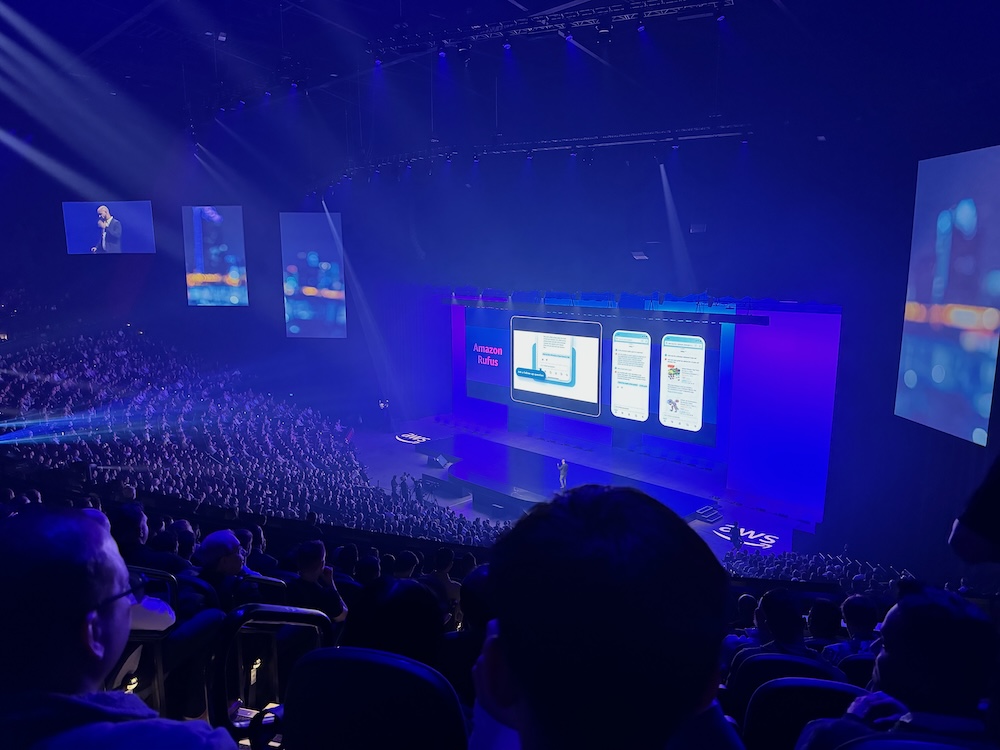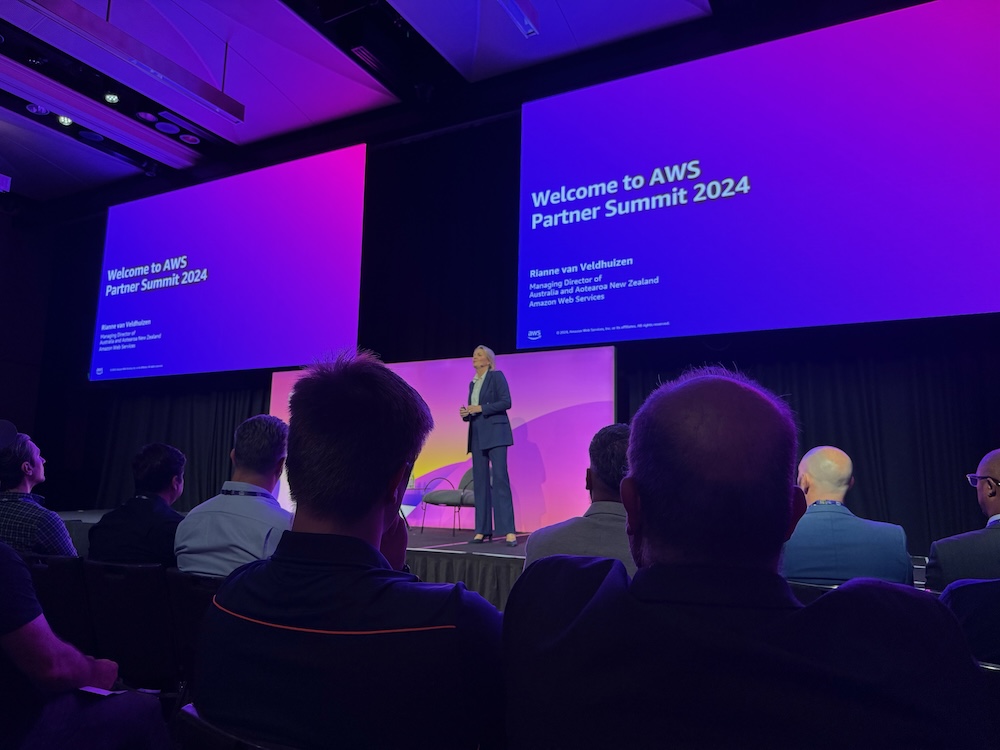AWS Summit Sydney 2024 brought a wave of innovation to the forefront with an unequivocal and unsurprising focus on generative AI. Attempting to quantify the number of times it was mentioned by both speakers and attendees would be near impossible, but there was plenty of evidence to suggest that the hype surrounding generative AI is warranted given an increasing number of use cases and real-world examples.
Up until now, generative AI has forced many organisations to ask the age old question that has been swirling around tech circles for decades – what problem does this technology solve? And the answer hasn’t always been immediately obvious. But given the hype of generative AI, which has resulted in greater urgency and experimentation, we’re now seeing more than just pockets of potential; it’s ushering in new ways of working and delivering on the metrics that matter most – time and costs.
Still, an obstacle early adopters faced was taking PoCs (Proof of Concepts) to production, especially those based in Australia and New Zealand who haven’t had local access to Amazon Bedrock – AWS’ fully managed generative AI service. Thankfully, AWS Summit Sydney 2024 announced the general availability of Amazon Bedrock in the Pacific (Sydney) region, which will enable lower latency for applications and greater control over data.
Let’s dig a little deeper into what the announcements at AWS Summit Sydney 2024 mean for generative AI, and how Amazon Bedrock not only helps PoCs go to production with greater governance and guardrails, but also allows partners such as DiUS to operate and integrate applications at scale.

Introduction to Amazon Bedrock and its availability in the Pacific (Sydney) region
Amazon Bedrock is a fully managed service offered by AWS specifically designed for building and implementing generative AI applications. It allows you to play with prompts and configurations, boost accuracy with knowledge bases, create task-oriented agents, train for improved performance, upgrade with Provisioned Throughput and evaluate different models.
“With Amazon Bedrock now available in the AWS Sydney Region, we’re giving customers even greater choice in where they run and train their generative AI workloads, supporting customers in highly regulated industries and those with low latency preferences to accelerate innovation, address business challenges, and help strengthen the nation’s digital economy through this transformative technology,” said Rianne Van Veldhuizen, managing director of Australia and New Zealand at AWS.
As for governance concerns, regional availability for Amazon Bedrock enables greater privacy and data security in a few key ways:
- Data Residency: By storing and processing data within a local zone (e.g., Amazon Bedrock Sydney), organisations can comply with regulations that restrict data from leaving a specific region. This is especially important for industries like government, healthcare, and finance, which often have strict data residency requirements.
- Reduced Risk of Data Transfer: Local processing minimises the movement of data across long distances. This reduces the risk of interception by unauthorised parties during transmission.
- Stronger Compliance: Local zones may adhere to stricter data security regulations compared to some overseas locations, which can simplify compliance efforts for organisations.
- Increased Transparency: With data geographically closer, organisations may have greater control over who has access and how it’s managed. This can be particularly valuable for maintaining data privacy.
How to take generative AI PoCs into production sooner rather than later
Some may look at generative AI and say it’s hype, or perhaps not as transformative as the market is suggesting. But in addition to use cases, AWS Summit Sydney shed light on customer success stories that have started to turn the dial, including Lonely Planet’s scalable gen AI platform, which has reduced itinerary generation costs by nearly 80%. Amazon Rufus, a new generative AI-powered conversational shopping experience, also demonstrated how easy it could be for retail customers to find and discover the best products to meet their needs.


DiUS has worked alongside several organisations wanting to experiment with generative AI and build PoCs to test the technology before committing additional budget and resources. But that doesn’t mean to say all of them go to production, as common blockers include:
- Poor quality or hard to access data
- No process to deploy or run solutions
- Data privacy, IP and sovereignty concerns
- Uncertainty about output quality and consistency
- A lack of vision, strategy, skills and/or in-house culture
- Difficulty in identifying and realising value
- Difficulty in estimating the cost of generative AI at scale
Taking all of this into consideration, it is perhaps no surprise that the path to production is one less travelled. While services such as Amazon Bedrock and its regional availability can help in certain areas, production-ready gen AI applications also require strategic and cultural support from the organisation itself, as well as technical leadership and engineering rigour from specialist partners.
- Strategy: From an internal perspective, consider your generative AI needs and goals, which should then inform your roadmap priorities. When it comes to external components, take a careful look at what competitors are doing and whether you need to adhere to legislative or privacy policies.
- Approach: Generative AI shouldn’t be viewed as a single solution or tool; it must integrate and be part of your entire technology strategy. In fact, some of the most valuable and exciting gen AI solutions we’ve worked on have wrapped around other technology and applications. Also, not all problems are suited to generative AI, so try to identify where it can automate tasks, personalise experiences, retrieve documentation, summarise text or create content. Augment your team and their tasks; don’t replace them.
- Culture: Generative AI thrives on experimentation, so a culture that embraces new things and adapts to failure is key. But innovation isn’t just invention; it’s also about accelerating progress through continuous improvement for right-now results or delivering an outcome in a completely new way with what you already have.
- Data: Although we have worked with clients who have collected their data in a structured, clean and centralised way, more often than not we see clients struggle to provide the data that is required for a generative AI, predictive AI or more traditional ML project. For such clients, we ask them to take a step back and invest in data engineering to enable crisp data pipelines and processing components. Garbage in, garbage out.
- Capability: Generative AI requires different toolsets, infrastructure and workflows to the norm. This means understanding how to frame the problem, identifying high-performing models, selecting the right performance metrics, and finally, deploying and productionising the application — all within a much broader business context. But according to a BCG-AWS gen AI survey, 4 out of 5 customers use partners such as DiUS to adopt generative AI due in part to skill gaps.
- MLOps: MLOps practices ensure gen AI models are continuously monitored, optimised and deployed effectively. This can include version control, performance tracking and building pipelines. Again this often requires the help of a partner or specialist, but with MLOps you’ll be able to avoid the pitfalls of scaling a gen AI application.
As the first partner in A/NZ to attain the AWS ML Competency, and the first in APJ to attain the AWS Applied AI Competency, DiUS is perfectly positioned to help organisations accelerate their generative AI journeys – from identifying use cases and initial experiments, to getting PoCs into production through strategic thinking and capability uplift.


This year’s AWS Partner Summit and ‘Partners Everywhere’ theme only reiterated our focus on working as closely as possible with cloud vendors such as AWS to ensure clients are getting the most from their technology investments including generative AI.
So get in touch to discuss all things generative AI with us.

